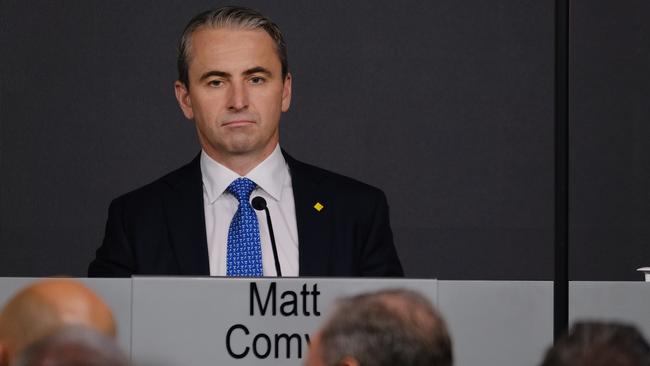The banks are turning mean, and it’s bad news for savers and shareholders
Cushioned by government support, Australia’s big banks are cutting their deposit rates for savings accounts and crushing their last remaining competitors.

Business
Don't miss out on the headlines from Business. Followed categories will be added to My News.
Consider this. In the space of a week Commonwealth Bank (share price up 75 per cent over five years) cut its deposit rates without waiting for the Reserve Bank to move.
Then the Bank of Queensland (share price down 30 per cent in five years) announced it would gut its own business and let go one in 12 staff.
It’s a funny thing, but when I started covering the banks about three decades ago I used to think the dominance of the “big four” would soon fade. After all, there were more than 10 regional banks, and 15 foreign banks had been granted permission to come into the market.
Well, that was wrong
Originally, all those regional banks were also listed on the sharemarket. Today, they are mostly brands within big banks; St George and Bank of Melbourne are inside Westpac, Suncorp is inside ANZ, and Bankwest is within CBA.
And guess what? Competition against the big four is miserable. There are now only a handful of struggling minnows.
A merger between BOQ and Bendigo is most likely the only way the two most important regional banks left standing can survive successfully.
The chief executive of Bank of Queensland, Patrick Allaway, who unleashed a brutal restructuring of the bank on Thursday, put it plainly: “Markets have shifted on us, and that shift is accelerating. The sustainability of the model, if margins don’t recover, is very questionable in the current environment.”
The suffocation of the banking industry by a few players is worse today than it has ever been and that regime is now fully backed by the government.
Just how thorough that government support has become is confirmed, not just because CBA along with several rivals cut investor deposit rates “outside the cycle”, but they cut them by more than the RBA is likely to announce for many months ahead.
Even assuming you are a happy bank shareholder – and if you are in CBA, then you will be particularly jolly – there is a price being paid here.
Investors were finally achieving passable risk-free deposit rates and that period looks like it’s coming to a close. Ironically, it’s partly due to the government support that banks may now ignore the RBA – and ignore the requirements of depositors.
Step by step the government has earnestly, or inadvertently, ring-fenced the big banks from the genuine market competition of rivals such as Bank of Queensland.
The original “four pillars” policy ring-fenced the banks from competition; the decision to explicitly guarantee the banks during the GFC confirmed they are too big to fail.
The third leg of this government support is less obvious. During the height of the Covid-19 emergency the RBA had pumped liquidity into the banking system. The quantitative easing of the pandemic created enormous financial support for the banks.

In fact, there is still more than $200bn worth of those funds washing through the banking system and it means the banks don’t need you – the depositor – as much as they did in the past.
Slowly but surely the banks have been watering down the product proposal for savers in recent years. A little-watched measure noted by Sam Wylie of the Melbourne Business School is the changing gap between the RBA cash rate and the deposit rates offered by banks. Looking at the numbers it’s clear that depositor have been getting a worse deal every year.
As Wylie puts it: “The Covid hangover in the banking system will take many years to unwind and depositors will suffer until it does.”
And keep in mind that erosion of returns on term deposits has been happening when rates were rising.
We are now at a turning point. For savers the message is clear; if you were ever going to lock in your deposit rates, lock them in now because bank rates – which are all that matter to you – are going down, whether the RBA ever moves official rates lower or not.
The rate available on deposits has dropped from around 5 per cent to around 4.5 per cent. That is still ahead of inflation and may look relatively good this time next year.
For bank shareholders, any decision you might have made to avoid regional bank stocks has probably made sense; Bendigo Bank has done better than BOQ but it is lagging miles behind any of the big four.
As for the big four banks, the outlook across the board is poor which is why there are “sell” notes on every single major bank stock – including CBA, despite its decision to lift the dividend after the recent annual result.
BOQ’s Allaway’s claim that “the rivers of gold are gone” will definitely echo across the major banks in the months ahead.
Inside the banks it may be harder to make money on the deposit side as rates drop, but on the other side of the book the mortgage lending is – believe or not – quite competitive.
As a result, the banks are shifting to the business lending to find growth, and that will be an uphill slog with local business conditions as they are and the fact that business lending is more risky than home mortgage lending.
For bank shareholders the choices have narrowed dramatically. For savers the curtains are coming down on decent deposit deals. It’s a mean business.
James Kirby hosts the twice weekly Money Puzzle podcast
More Coverage
Originally published as The banks are turning mean, and it’s bad news for savers and shareholders





